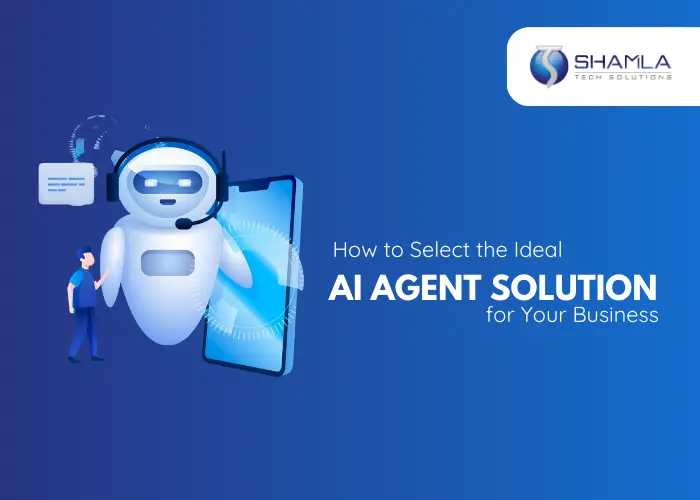What are AI Agents and How Do They Actually Work?
How AI Agents Function?
Perception: AI agents gather data from their environment through sensors, APIs, or other data sources. A virtual assistant like Siri processes voice input using speech recognition to understand user commands.
Processing and Understanding: Using natural language processing (NLP), AI agents can interpret and process human language. NLP allows agents to understand context, sentiment, and intent, enabling them to respond effectively.
Learning and Adaptation: Machine learning (ML) techniques enable AI agents to learn from past experiences or large datasets. Algorithms like neural networks or decision trees analyze the patterns in the data and improve their overall performance over time.
Decision-Making: AI agents make use of many reasoning methods like the rule-based systems, reinforcement learning, or probabilistic reasoning to make important decisions. They evaluate various options and choose actions that align with their goals.
Action and Interaction: Based on their analysis and decisions, AI agents perform specific actions. These actions can range from answering queries, controlling robots, or recommending personalized content.
Feedback Loop: Many AI agents have feedback mechanisms to assess the outcomes of their actions. This feedback helps them refine their algorithms and improve future performance.
Types of AI Agents
| AI Agent Type | What it Offers | Complexity | Example Use Cases |
| Simple Reflex Agent | Provides immediate, reactive responses based on specific inputs, with no memory of past actions. | Low | Basic automation, reactive systems like sensors or alarms |
| Model-Based Agent | Tracks the environment’s state and adapts its actions based on an internal representation of that state. | Medium | Autonomous navigation, state-based robotics, real-time monitoring |
| Goal-Based Agent | Prioritizes actions that lead to goal completion, evaluating each step towards achieving predefined objectives. | High | AI in strategic games, planning systems, task automation |
| Utility-Based Agent | Optimizes decision-making by assessing various options and selecting actions that maximize a utility function. | High | Resource allocation, optimization problems, personalized recommendations |
| Learning Agent | Continuously improves by learning from past experiences and feedback, adapting its actions to maximize performance. | Very High | Machine learning applications, predictive modeling, adaptive systems |
1. Simple Reflex Agents
Simple Reflex Agents are the simplest form of AI agents that operate solely on the present input without storing past experiences or using predictive models. These agents do not have memory or the ability to learn from prior interactions. They react directly to stimuli from the environment and base their decisions solely on predefined rules or programmed responses.
For instance, a chess-playing AI that selects moves based purely on current board configurations exemplifies a reactive agent. Such systems are effective for straightforward tasks where patterns can be pre-defined but fail in complex environments requiring strategic planning. Although reactive agents are limited in scope, their simplicity makes them computationally efficient, reliable, and suitable for applications like robot navigation and simple automation tasks.
2. Model-Based Agents
Model-based agents are more advanced and include a representation or model of the environment. This knowledge based agent in AI allows us to understand and predict how actions influence future states, enabling better decision-making. These agents rely on knowledge about the environment and use reasoning to select optimal actions based on both the current state and potential outcomes.
For example, a GPS navigation system that calculates the shortest route while considering traffic updates is a model-based agent. These agents can handle dynamic environments and complex tasks more effectively than reactive agents. However, they require more computational power and accurate environmental modeling. Model-based agents are widely used in applications such as robotics, planning systems, and intelligent virtual assistants.
3. Goal-Based Agents
Goal-based agents, one of the types of agents in AI go a step further by incorporating specific objectives they aim to achieve. These agents evaluate actions not just by immediate outcomes but by how well they help in achieving long-term goals. A self-driving car, for example, uses goal-based reasoning to prioritize safety, fuel efficiency, and time optimization while navigating traffic. These agents rely on utility functions or heuristics to rank actions based on their desirability.
This approach allows them to make decisions in situations with conflicting priorities or uncertainties. While powerful, goal-based agents are computationally intensive and require sophisticated algorithms to balance multiple objectives. They are commonly employed in areas like logistics, strategic games, and advanced decision-support systems. An AI agent development company can play a huge role in designing and implementing these agents, making sure that the complexities of balancing multiple goals are effectively managed.
4. Utility-Based Agents
Utility-based agents build upon goal-based agents by quantifying the satisfaction or utility of achieving different states. These agents aim to maximize overall utility rather than merely achieving a predefined goal. For example, an AI trading system may consider multiple factors such as risk, profit, and market trends to decide which stocks to buy or sell.
Utility-based agents weigh competing factors and choose actions that provide the highest cumulative benefit. They are ideal for environments with uncertainty, where some trade-offs are necessary. However, implementing utility-based reasoning requires complex modeling and significant computational resources. These agents are commonly used in fields like finance, healthcare, and optimization problems where nuanced decisions are critical.
5. Learning Agents
Learning agent is an intelligent agent in AI that has the special ability to get better over time by learning from their experiences and adjusting to changes in their surroundings. They are made up of four main parts: a learning part to gather knowledge, a decision-making part to make choices, a critic to judge the actions taken, and a problem generator to try out new strategies.
For example, an AI system on an online shopping website can look at customer behaviour to give personalized recommendations, getting better and more accurate as it gets more data. Learning agents are an important part of how machine learning and artificial intelligence are improving. While they are very flexible and adaptable, they need a lot of training data and computing power. These agents are used in many areas, like personalized marketing, self-driving cars, and systems that adjust automatically. If needed, you can lease these agents to start using them with lower costs while still getting the full benefits.








